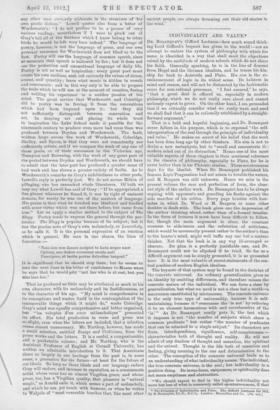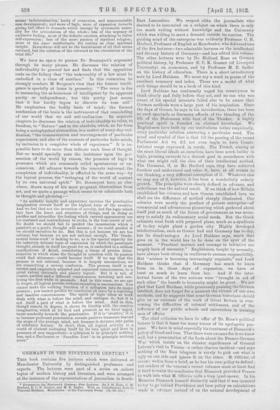INDIVIDUALITY AND VALUE.*
Du. BosAnn ET's Gifford Lectures—how much sound think- ing Lord Gifford's bequest has given to the world !---are an attempt to restate the system of philosophy with which his name is identified in a way that shall meet the objections raised by the multitude of modern schools which do not share his faith. Generally speaking, he is in the line of descent from Hegel and the German idealists, and he traces his kin- ship far back to Aristotle and Plato. His aim is the re- enthronement of login in its widest sense. He believes in mind and reason, and will not be distracted by the fashionable craze for non-rational processes. "I feel assured," lie says, " that a great deal is offered us, especially in modern philosophy, which we do not really care about and cannot seriously expect to prove. On the other hand, I am persuaded that if we critically consider what we really want and need we shall find that it can be rationally established by a straight. forward argument."
That is a bold and hopeful beginning, and Dr. Bosanquet never falters in his purpose, which is to expound "the self- interpretation of the real through the principle of individuality and value." He makes no secret of his belief that the work has been done long ago by other thinkers. His aim is not to devise a new metaphysic, but to "recall and concentrate tlt' modern mind out of its distraction." Hence one of the moat valuable aspects of these chapters is their continual reference to the classics of philosophy, especially to Plato, for he is never better than in his Platonic studies. These aro strenuous days for the idealist. When Dr. Bosanquet published his famous Logic Pragmatism had not arisen to trouble the waters, and M. Bergson was still unknown, Hence we miss in the present volume the ease and perfection of form, the clear- out style of the earlier work. Dr. Bosanquet has to be always arguing with opponents and guarding his flanks against the side marches of his critics. Every page bristles with foot- notes in which Dr. Ward or M. Bergson or some other doubter is dealt with. The book gives one the impression of the author thinking aloud, rather than of a formal treatise. In the form of lectures it must have been difficult to follow, for, though the main argument is clear, the constant recourse to side-issues and the refutation of criticisms, which would be necessarily present rather to the author's than to.the hearer's mind, might well baffle any one but a mature thinker. Not that the book is in any way ill-arranged or obscure. Its plan is a perfectly justifiable one, and Dr. Bosanquet could not be slipshod if he tried. So far as a difficult argument can be simply presented, it is so presented here. It is the most valuable of recent statements of the oen- tral position of modern English idealism.
The keynote of that system may be found in the doctrine of the concrete universal. An ordinary generalization gives us an identity by omitting differences, and therefore misses the concrete nature of the individual. We can form a class by generalization, but what we need is not a class but a world—a macrocosm constituted by microcosms. The concrete universe is the only true type of universality, because it is self- maintaining, because it "overcomes the 'is not' by reducing it to an element harmonious with and corroborative of the is,' " As Dr. Bosanquet neatly puts it, the test which it imposes is not "the number of subjects which share a common predicate " but rather " the number of predicates that can be attached to a single subject." Its characters arc form, interdependence, significance, self-completeness characteristics both of thought and reality. He will not admit of any dualism of thought and sensation, the spiritual and the animal. Thought is the life both of sensation and feeling, giving meaning to the one and determination to the other. The conception of the concrete universal leads us to an understanding of what individuality means. The individual, the true concrete universe, is the real ; but individuality is a positive thing. Its inwardness, uniqueness, or spirituality does not mean emptiness and abstraotion.
"We should expect to find in the higher individuality not more but less of what is commonly called spontaneousness, if that
The Principle of individuality and Value. The Gifford .Lecturee for 191L By B. Botatuquet, LL.D., D.C.L, London Macmillan and Co. 110e. net.]
means ' indetermination,' laxity of connexion, and unaccountable new development ; and more of logic, more of expansion towards giving full effect to demands which emerge by systematic neces- sity for the articulation of the whole ; loss of the urgency of exclusive feeling, more of the definite emotion attaching to fuller self-expression ; loss of the mere passion of mystical religion ; more of the amp). intellectualis Dd. resting on clear spiritual insight. Inwardness will not bo the banishment of all that seems outward, but the solution of the outward in tho circulation of the total life."
We have no spale to pursue Dr. Bosanquet's argument through its many phases. He discusses the relation of individuality to general law and finds that the opposition rests on the fallacy that " the universality of a law must be embodied in a class of similars." In this connexion he strongly combats M. Bergson's view that the human intelli- gence is specially at home in geometry. " The error is due to measuring the at-homeness of intelligence by its apparent purity or independence ; but this purity just means that it has hardly begun to discover its true self."
He emphasizes the bodily basis of mind; the formed mechanism of the brain is the instrument of that remodelling of our world that we cull self-realization. In separate chapters he discusses the relation of individuality to value, to freedom, to "Nature" and to the absolute, which, so far from being a metaphysical abstraction, is a matter of every-day veri- fication, "the transmutation and rearrangement of particular experiences, and also of the contents of particular finite minds, by inclusion in a completer whole of experience." It is im-
possible here to do more than indicate such lines of thought.
But we would specially note the insistence upon the per- meation of the world by reason, the presence of logic in processes which are commonly called spontaneous or un- conscious. All advance towards the concrete -universal, the completion of individuality, is effected in the same way—by the logical process, the "reshaping of the world of content by its own universal spirit." Dr. Hosanquet here, as else- where, draws many of his most pregnant illustrations from art, and we quote a passage which seems to us admirable both in thought and phrasing :— " As D3 ethdio insight and experience increase the penetrative imagination reveals itself as the highest form of the creative. And we feel that not the invention of novelty, but the logic which lays bare the heart and structure of things, and in doing so purifies and intensifies the feeling which current appearances are 100 confused and contradictory to evoke, is the true secret of art. No doubt we should fail to predict the incarnation which a painter's or a poet's thought will assume ; if wo could predict it we should ourselves be ho. But this is not because we are too rational, but because we are not rational enough. The funda- mental brain-work' is lacking to us; as is the special capacity for the infinitely delicate logic of expression by which the passionate thought, already in itself too great for us, is embodied in a million ramifications of detail, constituting a tissue of precise deter- mination in which alone the thought in question with its passion could find utterance—could become itself. If we say that the process is not rational, because it is largely unconscious, we are committing a serious confusion. The process itself is an intense and exquisitely adjusted and organized consciousness, to a great extent obviously and plainly logical. But it is not, of course, another and a different consciousness watching and ana- lysing the first while it proceeds. And in this sense, wo are apt to forget, all logical process without exception is unconscious. You cannot make the working function of a syllogism into its major
premiss ; you cannot predict its conclusion ab extra by a watching and inactive consciousness. The spirit of logic when at work deals with what is before the mind, and reshapes it ; but it is not itself a part of what is before the mind. And in this, though remote in degree, it shows its kinship with the creative imagination, which at its best and greatest, as we have urged, turns markedly towards the penetrative. If it is creative,' it is so because profound penetration reveals positive treasures beyond the scope of the average mind, not because it deviates into paths of arbitrary fantasy. In short, then, all logical activity is a world of content reshaping itself by its own spirit and laws in presence of new suggestions: a syllogism is in principle nothing less, and a Parthenon or ' Paradise Lost' is in principle nothing more."







































 Previous page
Previous page